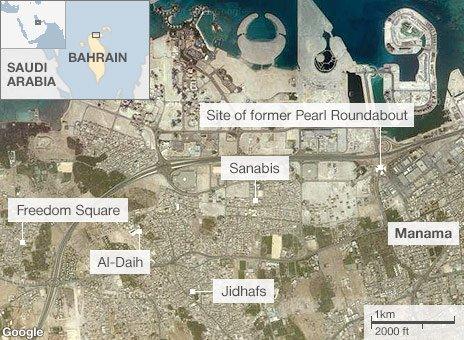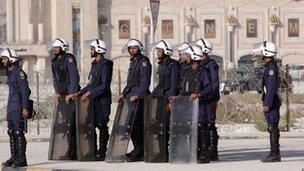Bahrain restricts protests on uprising anniversary
- Published
Bill Law reports for Newsnight from Bahrain where police and protesters have been clashing
There have been clashes on the outskirts of Bahrain's capital, Manama, as the opposition marked the first anniversary of pro-democracy protests.
Police fired rubber bullets and tear gas at youths in several villages, who hurled back petrol bombs and stones.
Large parts of Manama were also sealed off to prevent people reaching the site of the now-demolished Pearl Roundabout - the focus of last year's unrest.
A BBC correspondent said the city centre was largely quiet.
Most of the demonstrators were from the Gulf kingdom's Shia Muslim majority, which has long complained of discrimination at the hands of the Sunni royal family, the Al Khalifa, and wants democratic reforms.
Villages on 'lockdown'
The BBC's Bill Law, in Manama, said a massive police and army presence in the city ensured Tuesday saw no sign of the mass protests called by the opposition a year on from the peaceful takeover of Pearl Roundabout.
That - and the monument that used to stand at its centre - was demolished and replaced by a new junction last March, after protesters were forced out violently by the authorities.
The mainly Shia villages along the main routes to the city were on virtual "lockdown", including one where the BBC team was among those trapped in a square by police firing tear gas without provocation, our correspondent added.
Some people attempted to march towards the former Pearl Roundabout site from villages such as Sanabis, al-Daih and Jidhafs, which lie to the west.
The Bahrain Youth Society for Human Rights said 27 protesters had been arrested, including two of its members, while US-based rights organisation Witness Bahrain said six US citizens were arrested, external during a march. Bahrain's government said in a statement it would deport the six for falsely entering using tourist visas.
A doctor who treated people injured in last year's disturbances told the BBC Tuesday's situation was "chaotic", with clashes as people tried to get to the monument site. She said the security approach had got more severe since last year.
Another protester, called Mohammed, told the BBC: "The main roads in Bahrain... seem very normal because all protesters are now getting contained within their own villages and they've been attacked."
Shaikh Abdul-Aziz: Democracy has never stopped and we're not going to stop today
However, several people contacted the BBC to criticise the protest. One British expat said it had moved from "genuine protest to thuggery", describing demonstrators as "a bunch of kids who just want to make trouble".
"Normal Bahrainis are embarrassed by this nonsense," he added.
Masked youths
Overnight, in the run-up to the anniversary, riot police had used tear gas and stun grenades to disperse demonstrations in several villages, including Sitra and Sanabis. Some protesters threw stones and Molotov cocktails.
Protesters reportedly managed to get within 2km (1.5 miles) of the former site of Pearl Roundabout before being pushed back by riot police.
Meanwhile, about 120 expatriate construction workers were threatened by masked youths as they travelled home on two buses on Monday evening, the Gulf Daily News reported. The workers were forced to walk home.
On Tuesday morning, the government issued a statement blaming the main Shia opposition group, al-Wefaq, for turning what it said should have been a peaceful, government-sanctioned demonstration in the capital into a riot.
Al-Wefaq rejected the "unfounded accusations", and said the government was trying to delegitimise the people's demands.

"They have used excessive force against the people throughout all this time, but people keep coming back to the streets to insist on their demand to have a role in the decisions about their country,'' Abdul Jalil Khalil, a former MP, told the Associated Press.
In an interview with the German magazine Der Spiegel on Monday, external, King Hamad dismissed the opposition's complaints.
"We have made political reforms. We have just passed a number of amendments to the constitution which allow parliament to dismiss the government," he said.
"We invited everyone with openness. But some people boycotted the election and certain people just walked out of parliament. If you want a better system you have to join."
'Unfair trials'
The king also insisted Bahrain was already a constitutional monarchy, that were no political prisoners, and that members of the royal family who occupied influential government posts were there only "because of merit".
At least 35 people were killed between February and March 2011, 30 of them civilians and five security forces personnel, according to the human rights commission. It also found that security forces had used excessive force and tortured detainees, including five who died.

Large areas of the capital were sealed off by police on Tuesday
Almost 3,000 people were also arrested by security services after King Hamad declared a state of emergency in March and asked fellow Sunni-led Gulf states, notably neighbouring Saudi Arabia, to send in troops. Scores were tried by military courts and sentenced to prison terms of up to life after what human rights activists said were grossly unfair trials.
More than 4,000 private sector employees and civil servants were also sacked, and at least 30 Shia prayer centres were demolished.
Last month, King Hamad tried to address some of the protesters' demands by announcing constitutional reforms intended to lead to greater accountability. He also ordered the rebuilding of prayer centres and the reinstatement of those who had lost their jobs.
But the opposition, as well as human rights groups, say that the violent crackdown on dissent is continuing.
On Monday, Amnesty International said at least another 20 people had been killed since March "in the context of ongoing protests and excessive use of force by the security forces". Others put the death toll at 30.